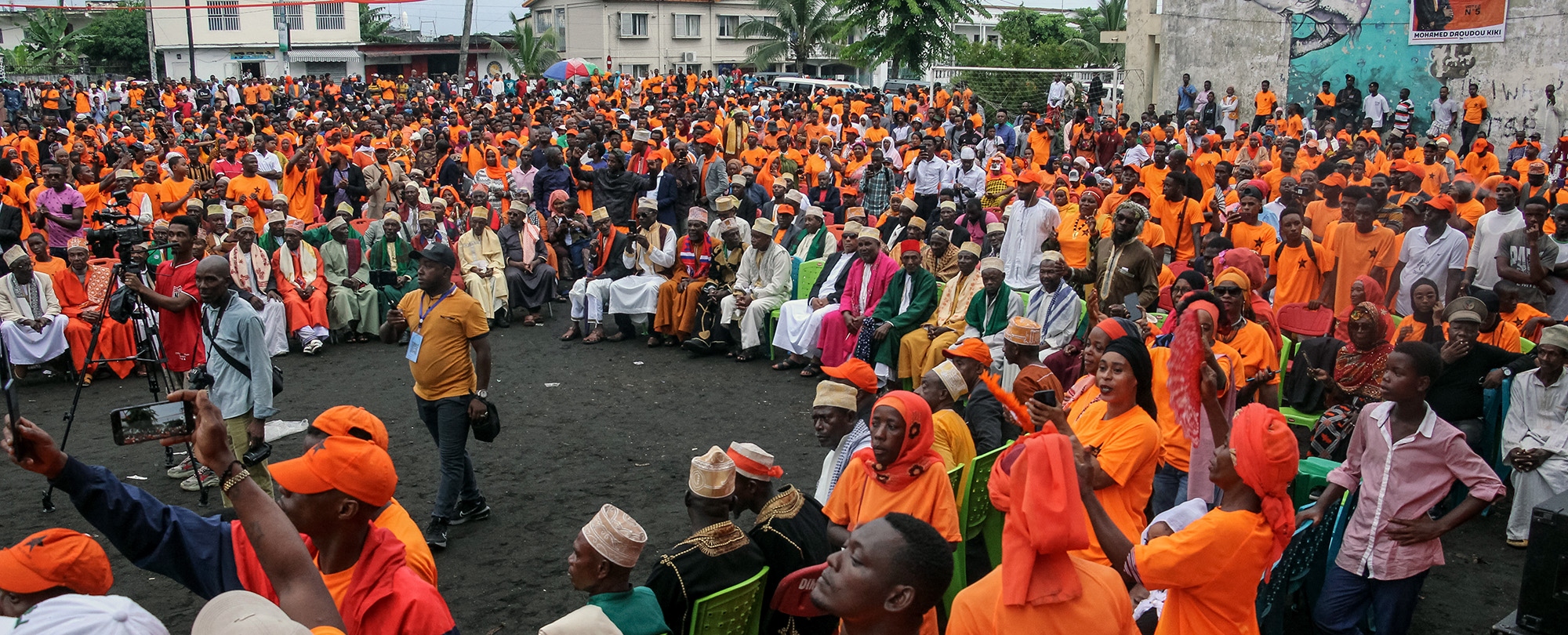Assoumani’s evasion of term limits has eroded that democratic progress and stability.
In Africa’s first presidential election of the year on January 14, Comoros President Azali Assoumani is running for a fourth term, abetted by a controversial 2018 referendum that has enabled him to sidestep presidential term limits. The ensuing Constitution dismantled the 2001 Fomboni Agreement, which had ushered in over 15 years of political stability in the archipelago of 880,000 people. The Agreement enshrined a power-sharing formula that saw the presidency rotate after a single presidential term among the three main islands: Grand Comore, Anjouan, and Moheli. The landmark Agreement ended an era in which Comoros suffered 20 coups since its independence in 1975.
Assoumani’s evasion of term limits has eroded that democratic progress and stability. The 2018 Constitution, furthermore, consolidated power under the executive by removing the offices of three vice presidents, each representing one of the three islands.

Supporters of Mohamed Daoudou (unseen), leader of Comoros’ opposition Orange Party, gather during his last rally in Moroni, on January 10, 2024, ahead of Comoros’ general elections. (Photo: Ibrahim YOUSSOUF / AFP)
Colonel Azali Assoumani first came to power in a coup in 1999, and subsequently served one presidential term from 2002-2006. He then stepped down and Comoros experienced three peaceful presidential transitions, including two transfers of power between political parties. This included Assoumani’s return to the presidency in 2016. However, rather than maintain the rotational power-sharing system, in 2018 Assoumani suspended the Constitutional Court, a democratically elected body. He then transferred its electoral duties to the Supreme Court, whose members are appointed by the President himself. This move enabled Assoumani to secure a second consecutive term (and third term overall) in the contested election of 2019, despite 12 opposition candidates rejecting the results. Observers from the African Union and elsewhere reported the vote was marred by irregularities.
Assoumani’s latest term has been marked by crackdowns on dissent and curtailments of press freedoms.
Assoumani’s latest term has been marked by crackdowns on dissent and curtailments of press freedoms. Journalists work in an atmosphere of intimidation and fear of arrest, resulting in widespread self-censorship. Demonstrations are regularly banned. Opposition party members are threatened and detained by the police and army. Many others have fled the country, and irregular migration to the neighboring French island of Mayotte has surged. Former president and member of the opposition Juwa Party, Ahmed Abdallah Sambi, was sentenced to life in prison on corruption charges in 2022, in what many view as a politically motivated attempt to remove a leading opposition figure from contesting the 2024 election.
Assoumani’s growing authoritarianism fits a pattern of African leaders who gain power through extraconstitutional means, then subsequently violate legal constraints on their time in power. These actions do not occur in isolation but are part of a broader deterioration of democratic checks and balances.
Some of Comoros’ main opposition parties are calling for a boycott of the January 14 presidential election. They allege that the vote will not be free and fair, as the Independent National Electoral Commission (CENI) is seen as favoring Assoumani. The opposition is calling for all political prisoners to be released, members of CENI to be replaced by an independent body, and for the army to remain out of the electoral process. The opposition also boycotted the 2018 referendum vote and the 2019 presidential elections in protest of Assoumani’s undermining of the power-sharing deal.
Assoumani’s growing authoritarianism fits a pattern of African leaders who gain power through extraconstitutional means, then subsequently violate legal constraints on their time in power.
Opposition leaders are also concerned that Assoumani is grooming his 39-year-old son, Nour El Fath Azali, to succeed the 65-year-old leader. Such a dynastic succession would be a further setback to the hard-fought democratic gains and stability that Comoros had enjoyed under the 2001 Constitution.
Additional Resources
- Abdou Moustoifa, “Comoros President Tipped to Win New Term Amid Partial Opposition Boycott,” Reuters, January 11, 2024.
- “Présidentielle comorienne : Azali brigue un 3e mandat,” VOA, January 11, 2024.
- Africa Center for Strategic Studies, “Term Limit Evasions and Coups in Africa: Two Sides of the Same Coin,” Infographic, October 24, 2023.
- Tom Collins, “Power Grab Destabilises Comoros,” New African Magazine, October 24, 2018.
More on: Democracy

